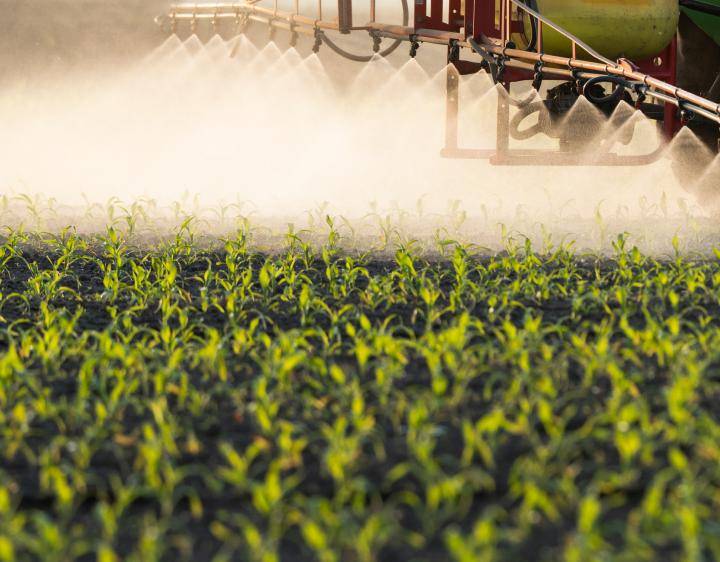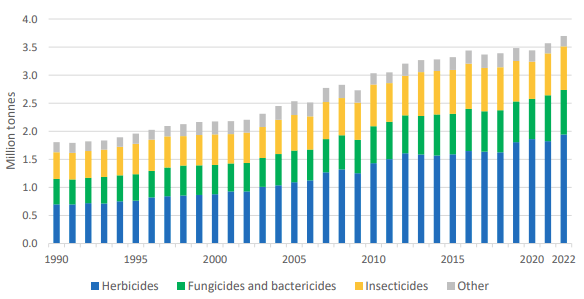Growing smarter: How innovation helps grow food sustainably


The growing crisis of food insecurity
At our firm’s book club, we are reading Ravenous – a fascinating deep dive into the complexities of food production and its impact on society. The book explores how modern agriculture has achieved incredible productivity while also highlighting the fragility of our food systems, which are increasingly vulnerable to climate change, supply chain disruptions, and unsustainable farming practices.
Food insecurity is one of the most pressing global challenges today. One in eleven people worldwide goes to bed hungry every night1, and a staggering 29% of the global population experienced moderate or severe food insecurity in 2023.2
There is no single cause of food insecurity. Rather, it stems from a web of interconnected factors, including conflict, climate change, poverty, the loss of farmland, food waste, and the lingering economic effects of the COVID-19 pandemic. As a result, the world is significantly behind in achieving Sustainable Development Goal 2 – Zero Hunger by 2030, making it imperative to find more sustainable solutions.
The relationship between pesticide use and food security
As the global population grows, the need to increase crop yields has led to a significant reliance on pesticides. Historically, pesticides have played a crucial role in protecting crops from pests and diseases, contributing to higher agricultural productivity. From 1990 to 2022, global pesticide use doubled in response to rising food demand.3
Global pesticides use by category4

However, excessive pesticide use has led to diminishing returns. Studies show that over-reliance on chemical pesticides contributes to soil depletion and degradation, water contamination, pest resistance, and biodiversity loss, ultimately threatening long-term yields.5,6 Synthetic nitrogen fertilizers also contribute to global warming by releasing nitrous oxide, a lesser-known greenhouse gas that traps 273 times more heat than carbon dioxide.7 The supply chain for these fertilizers is responsible for more than 10% of global emissions from agriculture.8
According to the Food and Agriculture Organisation, integrated pest management offers a more sustainable approach, combining biological pest control, precision application techniques, and other strategies to minimise pesticide dependency while maintaining high crop yields.9 A thriving ecosystem is essential for resilient food systems, as biodiversity helps buffer against external shocks like climate change. It is clear that pesticides have a role to play, but they must be used more strategically alongside sustainable farming practices.
Strengthening regulations
Recognising the risks associated with pesticides, policymakers are stepping up efforts to curb their use. The European Green Deal aims to reduce both the use and risk of chemical pesticides by 50% by 2030.10 Similarly, the Kunming–Montreal Global Biodiversity Framework, adopted in December 2022 under the UN Convention on Biological Diversity, sets a target to cut the overall risk from pesticides and hazardous chemicals by at least half.11
Some estimates suggest that adopting the European Green Deal targets globally could lead to a 12% reduction in agricultural yields.12 However, this doesn’t tell the whole story. Other policies under the European Green Deal such as reducing food waste, shifting towards plant-based diets, and increasing organic farming can help offset short-term yield reductions while improving long-term food security and ecosystem health.13
Sustainable solutions for agriculture
To mitigate the drawbacks of excessive pesticide use, we must invest in more sustainable agricultural technologies. Precision farming is one such solution, optimising resource use and improving crop yields through advanced tools like GPS guidance and data-driven decision-making.
One of our portfolio companies, Trimble, specialises in precision agriculture technologies, spanning seeding, fertiliser application, crop protection, and water management. For example, its weed protection system precisely applies herbicide only when a weed is detected by a sensor, potentially reducing herbicide usage by up to 90%.14
Another key innovator in sustainable farming is Croda, which develops solutions that reduce pesticide dependency while maintaining agricultural productivity. Croda’s agricultural adjuvants improve pesticide efficiency by enhancing droplet coverage on plant leaves and minimising spray drift, ensuring that the product reaches its intended target. Additionally, Croda’s advanced seed coating technologies protect seeds from pests and diseases while enhancing germination rates. By applying treatments directly to seeds, farmers can significantly reduce early-stage pesticide use by as much as 95% while maintaining crop health and yield.15
With growing awareness of the risks associated with excessive pesticide use and increasingly stringent environmental regulations, demand for sustainable farming solutions is accelerating. More importantly, economic benefits are driving adoption, as farmers increasingly recognise yield improvements and lower production costs as key incentives.16 This presents a compelling opportunity for our portfolio companies, whose innovative and effective alternatives to traditional pesticides position them well to benefit from this structural shift in agriculture. In addition, the next 12-month P/E multiples of both companies are trading below their five-year averages – with Croda near its five-year low17– presenting, in our view, compelling investment opportunities given the strong long-term demand for their products and services.
Securing the future of food
Food insecurity isn’t just an abstract global issue. It’s a challenge that affects millions of people every day, which demands a fundamental shift towards more sustainable agricultural practices. As impact investors, we support sustainable solutions that can make a real difference. By investing in innovative technologies like precision farming and advanced seed treatments, we can reduce pesticide reliance while ensuring long-term food security.
Sign up here to receive our monthly and quarterly commentaries in your inbox.
1 https://www.actionagainsthunger.org.uk/why-hunger/world-hunger-facts
2 https://openknowledge.fao.org/server/api/core/bitstreams/d5be2ffc-f191-411c-9fee-bb737411576d/content
3 https://openknowledge.fao.org/server/api/core/bitstreams/a8a8c2c8-ee36-42e8-a619-7e73c8daf8a6/content
4 Food and Agriculture Organisation of the United Nations. 2024. FAOSTAT: Pesticides Use.
5 https://pmc.ncbi.nlm.nih.gov/articles/PMC9428564/
6 https://www.ceh.ac.uk/press/comprehensive-global-study-shows-pesticides-are-major-contributor-biodiversity-crisis
7 https://eia-international.org/climate/nitrous-oxide/
8 https://phys.org/news/2022-09-fertilizers-global-emissions.html
9 https://www.fao.org/pest-and-pesticide-management/ipm/integrated-pest-management/en/
10 https://ec.europa.eu/eip/agriculture/en/news/green-deal-halving-pesticide-use-2030.html
11 https://www.cbd.int/gbf/targets/7
12 Beckman, J., Ivanic, M., Jelliffe, J. L., Baquedano, F. G. & Scott, S. Economic and Food Security Impacts of Agricultural Input Reduction under the European Union Green Deal’s Farm to Fork and Biodiversity Strategies (USDA ERS, 2020).
13 https://www.eea.europa.eu/publications/how-pesticides-impact-human-health
14 https://ptxtrimble.com/en/products/hardware/flow-application-control/weedseeker-2-spot-spray-system
15 https://www.crodaagriculture.com/en-gb/about-us/market-areas/seed-treatment
16 https://www.mckinsey.com/industries/agriculture/our-insights/global-farmer-insights-2024
17 FactSet data as of 1st April 2025